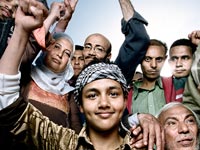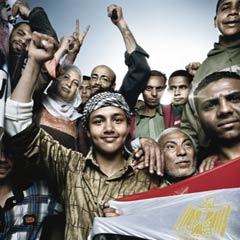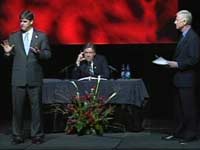Tahrir Storify
![]() “Voices from Tahrir”, a Storify list of sources, resources, sounds, inspirations, and videos used in the making of the public radio hour: More…
“Voices from Tahrir”, a Storify list of sources, resources, sounds, inspirations, and videos used in the making of the public radio hour: More…
![]() “Voices from Tahrir”, a Storify list of sources, resources, sounds, inspirations, and videos used in the making of the public radio hour: More…
“Voices from Tahrir”, a Storify list of sources, resources, sounds, inspirations, and videos used in the making of the public radio hour: More…

![]() Hearing Voices from NPR®
Hearing Voices from NPR®
131 Voices from Tahrir: Portrait of a Revolution
Host: Heba Morayef of Human Rights Watch
Airs week of: 2012-01-25
“Voices from Tahrir” (52:00 mp3):
Bread, Freedom, and Human Dignity:
January 25, 2011. One year ago, a revolution began in Cairo’s Tahrir Square. For the next eighteen days, millions of Egyptians across the country would demonstrate in the streets, demanding the end of their 30-year dictatorship. They were inspired by Tunisians, whose protests, that same month, had forced out the authoritarian regime of President Zine El Abidine Ben Ali. Now it was time for Egyptian President Hosni Mubarak to go.
A few weeks after the protests, the advocacy group Human Rights Watch interviewed some of the organizers of the January uprising: union leaders, civil rights workers, young social media activists, family members of of murdered protestors, and mothers who brought their kids to Tahrir to clean after the protests.. These Human Rights Watch interviews provide a rare, eyewitness account of a revolution, told by the Egyptian people, the activists, human rights defenders, and bloggers who persevered during those eighteen days.
The hour features recordings made in the square by reporters and citizen jounalists from around the world, including Daniel Finnan of Radio France Internationale, Al Jazeera, Egypt Daily News, Ramy Roof, and Matthew Cassel of Just Image.org.
Music: “Erhal (Leave)” and “Laugh, Revolution” by Ramy Essam; “Ezzay? (Why?)” by Mohamed Mounir and “Gomaa Hayran (Uncertain Friday)” by Joseph & James Tawadros
from the collection Our Dreams Are Our Weapons – Soundtracks of the Revolutions in Tunisia and Egypt. Mix: Robin Wise of Sound Imagery.
 A preview of our upcoming HV hour, “Voices from Tahrir” — a collaboration with Human Rights Watch. This public radio documentary features eyewitness accounts and recordings of the January uprisings (January 25 – February 11 2011) — the one-year anniversary approches:
A preview of our upcoming HV hour, “Voices from Tahrir” — a collaboration with Human Rights Watch. This public radio documentary features eyewitness accounts and recordings of the January uprisings (January 25 – February 11 2011) — the one-year anniversary approches:
“Voices from Tahrir- preview” (9:51 mp3):

“Government: Protecting and Serving the Shit Out of You”—
(stolen) from Liberty Maniacs Signs & Shirts.

![]() Hearing Voices from NPR®
Hearing Voices from NPR®
118 Hiker/Biker: Self-Propelled Travels
Host: Barrett Golding of Hearing Voices
Airs week of: 2011-07-06
“Hiker/Biker” (52:00 mp3):
Travels of the self-propelled, bipedal and by pedal:
Part 1: A bike trip through Yellowstone and Teton National Parks, into windstorms, between snowbanks, and in the middle of a bison herd. Interviewees: Rick McAdam, Yellowstone Park Ranger; Geyser Gazers at Old Failthful; Kathy Urbigkit of Spin a Yarn, Dubois WY; Wolves in West Yellowstone MT.
Part 2: Finishing seven hundred miles of miking and mic-ing in Wyoming, riding north on the east side of Yellowstone,. encounting killers, hunters, special forces, and trips to Heaven. Interviewees: Dan Herring, Herring & Sons Taxidermy, Thermopolis WY; Special Forces members Buck Wilkerson (US Army retired) and David Owens (Tech Sergeant, US Air Force) at Honor Our Special Operations Forces Weekend, Memorial Day, Cody WY; Pastor William Hardrick, Kingdom of Heaven Embassy visiting his kids in Riverton WY (photo gallery).
The paving of America as seen from the shoulders and sidewalks of our country’s roads. Musings-in-motion recorded during a 5000 trek from Arizona to Georgia to Maine. “It is becoming illegal to travel this country by foot.” Music by Jeff Arntsen. (A longer version of this story is at Third Coast International Audio Festival.)
Bhutan is a land of prayer flags, Buddhism, and, like everywhere else: poverty, poor health, and domestic violence, Queen Ashi Sangay Choden Wangchuk believes her job is to increase the Gross National Happiness. To do that she treks into the most remote corners of the country, meeting people she’d otherwise never see, asking about their lives, helping them with health care issues, and working to end mistreatment of woman. Outer Voices accompanied her into an unmapped corner of the high Himalayas — they are the first foreign journalists invited to accompany a Bhutanese monarch on a trek, and to interview the Queen.

The Queen of Bhutan, Ashi Sangay Choden Wangchuck, with her people (photo: Jack Chance)
The Queen’s Trek (PRX) was produced by OV’s Stephanie Guyer-Stevens and Jack Chance, Guerilla Ethnomusicologist for The Mountain Music Project. Major Underwriting was provided by Terry Causey and the Shelly and Donald Rubin Foundation. Interviewees: Chimi Wangmo, Kunzang Choden, Yeshey Dorji and Queen Ashi Sangay Choden Wangchuk. Musical performances by Jigme Drukpa and the Khuju Luyang Ensemble.
Special thanks to Her Majesty Queen Ashi Sangay Choden Wangchuk, the staff and clients of RENEW Bhutan, Tshering Uden Penjor, Françoise Pommaret, Ariana Maki, the Royal Body Guard and the Royal Bhutan Army, the Zulikha Nunnery, Hotel Zhi Waling, and the people of Daifam, Zamtari, and Shinka Lauri villages.
RENEW = Respect Educate, Nurture and Empower Women, “an organization dedicated to the empowerment of vulnerable women of our society so that they can emerge as socially and economically independent members of their communities.”
HV are spoken word evangelists. But sometimes it’s best to keep your mouth shut. Like in this one-minute piece of performance art on the US House floor, delivered by Rep. Joe Crowley (D-NY) on the House floor, April 14 2011:

![]() Hearing Voices from NPR®
Hearing Voices from NPR®
115 Refugees: Forced to Leave
Host: Barrett Golding of Hearing Voices
Airs week of: 2011-05-11
“Refugees” (52:00 mp3):
The journeys of people driven from their homeland by war, disaster, and persecution:
From One Thing: The producers spent a year talking to refugees living in USA about why they had to leave their country, how they got here, and what “One Thing” they brought with that reminds them of home. In this first of several stories from the series, the Sher Ali family, a mother and nine children, was the first Afghan family to be resettled in Amarillo, Texas in 2000. They fled the Taliban in the middle of the night with only the clothes they wore. Their one thing was a photo of their father. (Produced for Weekend America w/ photo gallery.)
The stories of Burmese refugees, the Karen people, recorded in the camps on the Thailand-Burma border, and in their new American homes. Thru it all their music preserves their culture. Part of The Mountain Music Project.
The One Thing for the Augustin family was their home movies. Their religious beliefs forced them out of Iraq: Mom Nujood is a Chaldean Christian and Dad Abdullahad is a Latin Catholic. The Augustins left a comfortable life in Baghdad for Jordan, where limited opportunities siphoned much of their savings. They arrived in Detroit, where son Arkan takes pre-med courses at the local community college, while working part-time at a grocery store. (Produced for Weekend America: From Iraq to Detroit.)
Starting with the fall of Saigon in April 1975, refugees from Vietnam awaited approval to move to the US and other countries. By 1979, there were almost 62,000 Vietnamese in refugee camps, with more than 140,000 people displaced from Cambodia and Laos. Portland, Oregon, was one of the medium-sized US cities that dealt with the relatively sudden influx of every major ethnic group (Vietnamese, Lao, Hmong, Mein and Cambodian) from Southeast Asia. More than 25 former refugees were interviewed for radio piece, and movie below.
 Ellen Rocco, GM of North Country public Radio, has this memorial to the Public Telecommunications Facilities Program (PTFP), a recently defunded .gov agency, that helped buy gear used to bring you your local pubradio:
Ellen Rocco, GM of North Country public Radio, has this memorial to the Public Telecommunications Facilities Program (PTFP), a recently defunded .gov agency, that helped buy gear used to bring you your local pubradio:
The folks who run the PTFP are people you will never read about in the news or see on television. Bill Cooperman and his team are the kind of federal employees who belie all the nasty stereotypes we hear about “bureaucrats.” They are helpful, they want to see stations succeed, and they understand when unforeseen circumstances force changes in timelines (e.g., bad weather keeps us from installing a new facility as planned).
—Ellen, Rocco, “Alphabet soup, public radio and gratitude.”
From Funny or Die, “Sarah Palin Media Addict”(starring Gina Gershon):
More FOD Gina Does Sarah:
Gina Gershon Strips Down Sarah Palin
NYTimes Lens blog has a great post on what to bring and “What Not to Bring to Tahrir Square: Stephen Farrell Learns to Pack a Smaller Camera Kit.”
CAIRO — It is rare that the most important piece of equipment in your bag is the bag itself, even more rare for that bag to be a black plastic trash sack slung over your shoulder as you walk past pro-government thugs on a bridge over the River Nile. The trash bag’s purpose, of course, is to conceal your large nylon camera bag, which is likely to get you grabbed off the street by the aforementioned thugs.
Sometimes the hardest part of a story is getting there. Sometimes it is getting around. Sometimes it is obstructive intelligence agencies and soldiers. Sometimes it is lawlessness, sometimes overattentive law enforcement. Sometimes it is lack of transport, poor communications, power blackouts, accreditation difficulties or a hostile local population.
Though my colleagues and I have worked in far more dangerous places and under far more primitive conditions, I don’t think I’ve ever before covered a story in which all the above-mentioned obstacles were present and taking turns on a daily — sometimes hourly — basis to become the principal barrier to getting the journalist in and the story out.
Democracy is the peaceful passing of power, as exemplified by this Jimmy Kimmel clip:
And what’s with Boehner’s Big Gavel?
HV’s Jack Chance did the sound for the Timothy Syrota video, documenting the 20K Burmese refugees who’ve recently fled to the Thai border:
Fleeing Myawaddy

![]() Hearing Voices from NPR®
Hearing Voices from NPR®
103 Political Party: For Election Season
Host: Barrett Golding of Hearing Voices
Airs week of: 2010-10-27
“Political Party” (52:00 mp3):
Let’s rev-up this election process with a cross-county Political Party:
Salt Lake City Mayor Rocky Anderson publicly debates FOX News host Sean Hannity. The spectacle took place inside a chasm called Us versus Them. Produced in 2007 for This American Life; music: Rickie Lee Jones, “Nobody Knows My Name” from Sermon On Exposition Boulevard.
Politics can be frustrating. It can make you scream — which made one Presidential candidate became famous for. Here’s Howard Dean’s scream put to music (more mixes at James Lileks’ Bleatophony).
From the 1980s archives, we present this pre-teen perspective on our government’s founding document.
 From Carlin’s 7 words to Stern’s shock Jock to Jackson’s right breast, Newsweek put together this entertaining timeline of FCCProfanity on TV: The FCCs Evolving Rules.”
From Carlin’s 7 words to Stern’s shock Jock to Jackson’s right breast, Newsweek put together this entertaining timeline of FCCProfanity on TV: The FCCs Evolving Rules.”
via Amy Mayer.
The final four games were great, but even better was seeing the Prez take on former pro Pacers star Clark Kellog in a game of HORSE, renamed POTUS for this CBS playground matchup. Makes me proud to have a Prez that can talk policy, talk trash, while consistently sinking nada-but-net from 3-point land:

![]() Hearing Voices from NPR®
Hearing Voices from NPR®
085 Protest: At the National Mall & Town Halls
Host: Barrett Golding of Hearing Voices
Airs week of: 2011-03-23 (Originally: 2010-02-24)
“Protest” (52:00 mp3):
Protest may be new to some parts of the world, but in America, complaining about the government is a national pastime. We hear protest music and mashups; we go to protest marches, from Vietnam War era actions on the National Mall, to modern-day Tea Parties and Town Halls:
Protest used to be mainly for the young and left-leaning, but recently older right-wingers have joined the party — the Tea Party. When Congressmen went home in 2009, this is what they heard from constituents. Music: Jeff Arntsen, mix: Robin Wise, audio: excerpted from YouTube videos.
A sound collage of protests and protest music over the past 40 years
The popular Burmese rock band Iron Cross is using music to challenge the nation’s infamously repressive regime. In the great tradition of rock and roll, Iron Cross is taking on Burma’s military government with song.